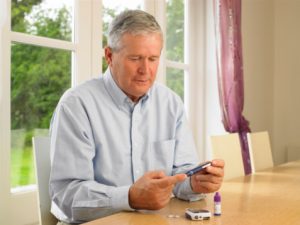According to the University of Wisconsin, the prevalence of erectile dysfunction is about five percent for men over 40, but jumps to 15 percent for men over the age of 70. Erectile dysfunction (ED) is when a man can no longer have, or has difficulties holding, an erection.
Recent research has uncovered that Type 2 diabetes risk is higher among men who have erectile dysfunction.
Link between erectile dysfunction and Type 2 diabetes
Link between erectile dysfunction and Type 2 diabetes
Researchers from the University of Toronto uncovered a link between erectile dysfunction and the risk of developing Type 2 diabetes.
Data was collected from 4,500 men over the age of 20, who were part of the U.S National Health and Nutrition Examination Survey between 2001 and 2004.
 Researchers looked at erectile dysfunction along with blood pressure, cholesterol and Type 2 diabetes. They found there was no association between erectile dysfunction and undiagnosed hypertension or cholesterol.
Researchers looked at erectile dysfunction along with blood pressure, cholesterol and Type 2 diabetes. They found there was no association between erectile dysfunction and undiagnosed hypertension or cholesterol.
On the other hand, they did uncover a link between Type 2 diabetes and erectile dysfunction.
Among men aged 40 to 59, the prevalence of undiagnosed Type 2 diabetes was 19 percent in those who also had erectile dysfunction. Only three percent of men without ED suffered from undiagnosed Type 2 diabetes based on the data.
Aside from diabetes, erectile dysfunction is also a risk factor for developing heart disease. The new research urges men who are being treated for erectile dysfunction to get tested for diabetes and factors contributing to heart disease.
Tips to overcome erectile dysfunction
 Erectile dysfunction can greatly affect a man’s sense of self so preventing it will not only lower your risk of diabetes, but will still have you feeling like your self. Many preventative measures for erectile dysfunction can also be applied to diabetes. Below are a few strategies that men can use to prevent erectile dysfunction and lower their risk of diabetes:
Erectile dysfunction can greatly affect a man’s sense of self so preventing it will not only lower your risk of diabetes, but will still have you feeling like your self. Many preventative measures for erectile dysfunction can also be applied to diabetes. Below are a few strategies that men can use to prevent erectile dysfunction and lower their risk of diabetes:- Maintain healthy cholesterol and blood pressure
- Control diabetes
- Treat sleep disorders
- Don’t smoke
- Reduce stress
- Treat any mental health issues
- Perform exercises – In particular Kegel exercises. This can be done to strengthen bladder and bowel muscles, but can also improve ED. It can be done anywhere simply by contracting your muscles as if you were holding in your urine. Hold that feeling for a few seconds and release. Repeating this action daily can help improve ED.
References:
http://consumer.healthday.com/diabetes-information-10/misc-diabetes-news-181/men-with-erectile-dysfunction-more-likely-to-have-type-2-diabetes-701499.html
http://www.diabetes.org/living-with-diabetes/treatment-and-care/men/erectile-dysfunction.html
http://www.webmd.com/erectile-dysfunction/guide/preventing-edhttp://www.healthline.com/health/erectile-dysfunction-prevention#ChronicIllness3
http://www.uwhealth.org/urology/erectile-dysfunction-ed/20537
http://www.diabetes.org/living-with-diabetes/treatment-and-care/men/erectile-dysfunction.html
http://www.webmd.com/erectile-dysfunction/guide/preventing-edhttp://www.healthline.com/health/erectile-dysfunction-prevention#ChronicIllness3
http://www.uwhealth.org/urology/erectile-dysfunction-ed/20537

helpful post. thanks!
ReplyDeletepankaj